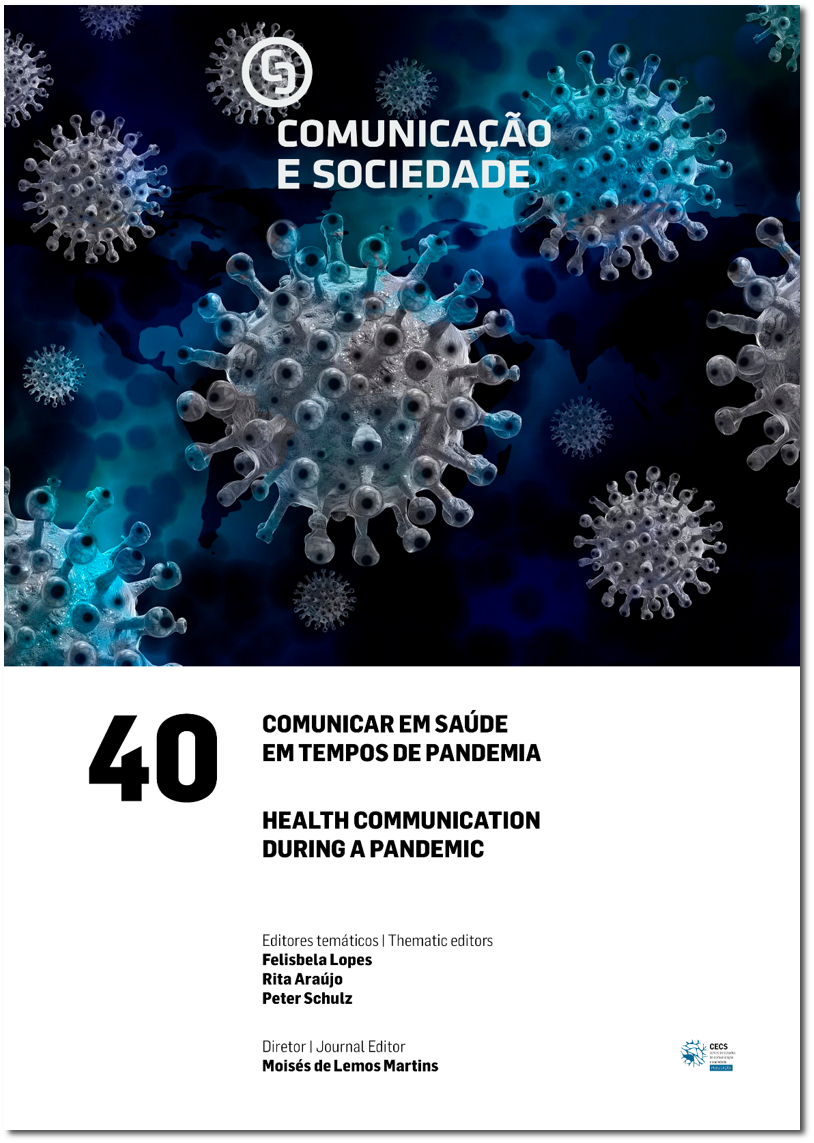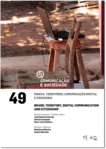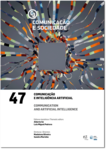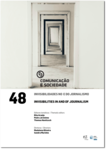Teorias da Conspiração em Tempos de Pandemia Covid-19: Populismo, Media Sociais e Desinformação
DOI:
https://doi.org/10.17231/comsoc.40(2021).3324Palavras-chave:
media, media sociais, desinformação, teorias da conspiração, covid-19, infodemiaResumo
As plataformas de media sociais são há muito reconhecidas como grandes disseminadoras de desinformação sobre saúde. Estudos anteriores encontraram uma associação positiva entre a utilização dos media sociais como fonte principal de informação e a aceitação de formas de desinformação, como teorias da conspiração. Encontra-se ainda descrita a associação entre atitudes populistas e a valorização da informação através dos media sociais. A partir de um questionário aplicado a 242 respondentes após o primeiro estado de emergência da pandemia da covid-19 (março de 2020), em Portugal, o presente estudo possui como objetivo identificar antecedentes e pré-requisitos da crença em desinformação. Os dados obtidos sugerem que indivíduos com sentimentos populistas possuem menor confiança em estratégias institucionais de combate à pandemia, privilegiam os media sociais como fonte de informação e revelam uma maior aceitação de teorias da conspiração sobre a doença. A ligação, documentada na literatura, entre crença em teorias da conspiração e comportamentos de risco, recomenda a adoção de medidas de combate aos fatores de desinformação.
Downloads
Referências
Albertazzi, D., & McDonnell, D. (2008). Introduction: The sceptre and the spectre. In D. Albertazzi & D. McDonnell (Eds.), Twenty-first century populism: The spectre of western European democracy (pp. 1–11). Palgrave.
Allington, D., Duffy, B., Wessely, S., Dhavan, N., & Rubin, J. (2021). Health-protective behaviour, social media usage and conspiracy belief during the covid-19 public health emergency. Psychological Medicine, 51(10), 1763–1769. https://doi.org/10.1017/S003329172000224X
Anspach, N. M., & Carlson, T. N. (2020). What to believe? Social media commentary and belief in misinformation. Political Behavior, 42, 697–718. https://doi.org/10.1007/s11109-018-9515-z
Barua, Z., Barua, S., Aktar, S., Kabir, N., & Li, M. (2020). Effects of misinformation on covid-19 individual responses and recommendations for resilience of disastrous consequences of misinformation. Progress in Disaster Science, 8, 1–9. https://doi.org/10.1016/j.pdisas.2020.100119
Bennett, W. L., & Manheim, J. B. (2006). The one-step flow of communication. Annals of the American Academy of Political & Social Science, 608(1), 213–232. https://doi.org/10.1177/0002716206292266
Boberg, S., Quandt, T., Schatto-Eckrodt, T., & Frischlich, L. (2020). Pandemic populism: Facebook pages of alternative news media and the corona crisis - A computational content analysis [Working paper]. Muenster Online Research (MOR). https://arxiv.org/pdf/2004.02566.pdf
Canovan, M. (2002). Taking politics to the people: Populism as the ideology of democracy. In Y. Mény & Y. Surel (Eds.), Democracies and the populist challenge (pp. 25–44). Palgrave.
Chen, X., Sin, S. C. J., Theng, Y. L., & Lee, C. S. (2015). Why students share misinformation on social media: Motivation, gender, and study-level differences. The Journal of Academic Librarianship, 41(5), 583–592. https://doi.org/10.1016/j.acalib.2015.07.003
Craft, S., Ashley, S., & Maksl, A. (2017). News media literacy and conspiracy theory endorsement. Communication and the Public, 2(4), 388–401. https://doi.org/10.1177%2F2057047317725539
Douglas, K. M., & Sutton, R. M. (2008). The hidden impact of conspiracy theories: Perceived and actual influence of theories surrounding the death of Princess Diana. The Journal of Social Psychology, 148, 210–222. https://doi.org/10.3200/SOCP.148.2.210-222
Edelman. (2020, 5 de maio). 2020 Edelman trust barometer spring update: Trust and the coronavirus. https://www.edelman.com/research/trust-2020-spring-update
Freeman, D., Waite, F., Rosebrock, L., Petit, A., Causier, C., East, A., & Lambe, S. (2020). Coronavirus conspiracy beliefs, mistrust, and compliance with government guidelines in England. Psychological Medicine, 1–13. https://doi.org/10.1017/S0033291720001890
Fuchs, C. (2020). Everyday life and everyday communication in coronavirus capitalism. tripleC: Communication, Capitalism & Critique, 18(1), 375–399. https://doi.org/10.31269/triplec.v18i1.1167
Goreis, A., & Kothgassner, O. D. (2020). Social media as vehicle for conspiracy beliefs on covid-19. Digital Psychology, 1(2), 36–39. https://doi.org/10.24989/dp.v1i2.1866
Hameleers, M., Bos, L., & Vreese, C. H. d. (2019). Shoot the messenger? The media’s role in framing populist attributions of blame. Journalism, 20(9), 1145–1164. https://doi.org/10.1177%2F1464884917698170
Howell, L. (2013). Digital wildfires in a hyperconnected world. World Economic Forum. https://reports.weforum.org/global-risks-2013/risk-case-1/digital-wildfires-in-a-hyperconnected-world/
Katsampekis, G., & Stavrakakis, Y. (2020). Populism and the pandemic: Introduction and preliminary findings. In G. Katsampekis, & Y. Stavrakakis (Eds.), Populism and the pandemic: A collaborative report (pp. 3–9). Loughborough University. https://hdl.handle.net/2134/12546284.v1
Krämer, B. (2014). Media populism: A conceptual clarification and some theses on its effects. Communication Theory, 24, 42–60. https://doi.org/10.1111/comt.12029
Kriesi, H. (2014). The populist challenge. West European Politics, 37(2), 361–378. https://doi.org/10.1080/01402382.2014.887879
Longstaff, P. H. (2005). Security, resilience, and communication in unpredictable environments such as terrorism, natural disasters and complex technology. Harvard University; Center for Information Policy Research.
Matthes, J., & Schmuck, D. (2017). The effects of anti-immigrant right-wing populist ads on implicit and explicit attitudes: A moderated mediation model. Communication Research, 44(4), 556–581. https://doi.org/10.1177/0093650215577859
Mazzoleni, G. (2003). The media and the growth of neo-populism in contemporary democracies. In G. Mazzoleni (Ed.), The media and neo-populism: A contemporary comparative analysis (pp. 1– 20). Praeger.
Mitchell, A., Simmons, K., Matsa, K. E., Silver, L., Shearer, E., Johnson, C., Walker, M., & Taylor, K. (2018, 14 de maio). In western Europe, public attitudes toward news media more divided by populist views than left-right ideology. Pew Research Center. https://www.pewresearch.org/journalism/2018/05/14/in-western-europe-public-attitudes-toward-news-media-more-divided-by-populist-views-than-left-right-ideology/
Mudde, C. (2004). The populist zeitgeist. Government and Opposition, 39(4), 542–563. https://doi.org/10.1111/j.1477-7053.2004.00135.x
Newman, N., Fletcher, R., Kalogeropoulos, A., & Nielsen, R. K. (2019). Reuters Institute digital news report 2019. Reuters Institute for the Study of Journalism.
Nielsen, R. K., Fletcher, R., Newman, N., Brennen, J. S., & Howard, P. N. (2020). Navigating the ‘infodemic’: How people in six countries access and rate news and information about coronavirus. Reuters Institute for the Study of Journalism.
Papacharissi, Z. A. (2010). A private sphere: Democracy in a digital age. Polity.
Peter, C., & Koch, T. (2019). Countering misinformation: Strategies, challenges, and uncertainties. Studies in Communication and Media, 8(4), 431–445. https://doi.org/10.5771/2192-4007-2019-4-431
Popper, K. R. (2012). A sociedade aberta e os seus inimigos - Vol. I. Edições 70.
Ravindran, T., Yeow Kuan, A. C., & Hoe Lian, D. G. (2014). Antecedents and effects of social network fatigue. Journal of the Association for Information Science and Technology, 65(11), 2306–2320. https://doi.org/10.1002/asi.23122
Romm, T. (2020, 29 de fevereiro). Millions of tweets peddled conspiracy theories about coronavirus in other countries, an unpublished U.S. report says. The Washington Post. https://www.washingtonpost.com/technology/2020/02/29/twitter-coronavirus-misinformation-state-department/
Sahni H., & Sharma, H. (2020). Role of social media during the covid-19 pandemic: Beneficial, destructive, or reconstructive? International Journal of Academic Medicine, 6(2), 70–75. https://doi.org/10.4103/IJAM.IJAM_50_20
Schulz, A., Müller, P., Schemer, C., Wirz, D. F., Wettstein, M., & Wirth, W. (2017). Measuring populist attitudes on three dimensions. International Journal of Public Opinion Research, 30(2), 316–326. https://doi.org/10.1093/ijpor/edw037
Schulz, A., Wirth, W., & Müller, P. (2020). We are the people and you are fake news: A social identity approach to populist citizens’ false consensus and hostile media perceptions. Communication Research, 47(2), 201–226. https://doi.org/10.1177/0093650218794854
Shoemaker, P. J., & Vos, T. P. (2009). Gatekeeping theory. Routledge.
Stroud, N. J. (2008). Media use and political predispositions: Revisiting the concept of selective exposure. Political Behavior, 30(3), 341–366.
Talwar, S., Dhir, A., Kaur, P., Zafar, N., & Alrasheedy, M. (2019). Why do people share fake news? Associations between the dark side of social media use and fake news sharing behavior. Journal of Retailing and Consumer Services, 51, 72–82. https://doi.org/10.1016/j.jretconser.2019.05.026
Tsfati, Y., & Cappella, J. N. (2003). Do people watch what they do not trust? Exploring the association between news media skepticism and exposure. Communication Research, 30, 504–529. https://doi.org/10.1177/0093650203253371
Uscinski, J. E., & Parent, J. M. (2014). American conspiracy theories. Oxford University Press
Vaccari, C., & Valeriani, A. (2015). Follow the leader! Direct and indirect flows of political communication during the 2013 Italian general election campaign. New Media & Society, 17(7), 1025–1042. https://doi.org/10.1177/1461444813511038
Valenzuela, S., Halpern, D., Katz, J. E., & Miranda, J. P. (2019). The paradox of participation versus misinformation: Social media, political engagement, and the spread of misinformation. Digital Journalism, 7(6), 802–823. https://doi.org/10.1080/21670811.2019.1623701
Vraga, E., Tully, M., & Bode, L. (2020). Empowering users to respond to misinformation about covid-19. Media and Communication, 8(2), 475–479. https://doi.org/10.17645/mac.v8i2.3200
World Health Organization (WHO) [@WHO]. (2020, 8 de fevereiro). At WHO, we’re not just battling the #2019nCoV virus; we’re also battling the trolls and conspiracy theorists that push [Tweet]. Twitter. https://twitter.com/who/status/1226169840358109184?lang=de
Wu, L., Morstatter, F., Carley, K. M., & Liu, H. (2019). Misinformation in social media: Definition, manipulation, and detection. SIGKDD Explorations, 21, 80–90. https://doi.org/10.1145/3373464.3373475
Downloads
Publicado
Como Citar
Edição
Secção
Licença
Direitos de Autor (c) 2021 Gil Baptista Ferreira

Este trabalho encontra-se publicado com a Creative Commons Atribuição-NãoComercial 4.0.
Os autores são titulares dos direitos de autor, concedendo à revista o direito de primeira publicação. O trabalho é licenciado com uma Licença Creative Commons - Atribuição 4.0 Internacional.











